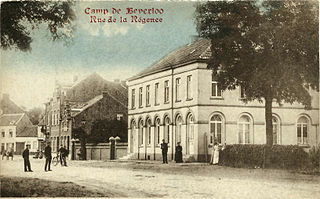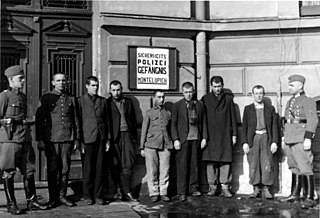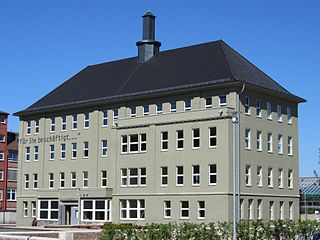 W
WBeverloo Camp was a military installation at Leopoldsburg, Belgium; 70 km southeast of Antwerp.
 W
WA gas chamber is an apparatus for killing humans or other animals with gas, consisting of a sealed chamber into which a poisonous or asphyxiant gas is introduced. Poisonous agents used include hydrogen cyanide, carbon dioxide and carbon monoxide.
 W
WA gas van or gas wagon was a truck reequipped as a mobile gas chamber. During World War II and the Holocaust, Nazi Germany developed and used gas vans on a large scale as an extermination method to murder inmates of asylums, Poles, Romani people, Jews, and prisoners in occupied Poland, Belarus, Yugoslavia, the Soviet Union, and other regions of German-occupied Europe. During the Great Purge, Soviet NKVD used gas vans for killing prisoners.
 W
WInteressengemeinschaft Farbenindustrie AG, commonly known as IG Farben, was a German chemical and pharmaceutical conglomerate. Formed in 1925 from a merger of six chemical companies—BASF, Bayer, Hoechst, Agfa, Chemische Fabrik Griesheim-Elektron, and Chemische Fabrik vorm. Weiler Ter Meer—it was seized by the Allies after World War II and divided back into its constituent companies.
 W
WThe Kraków-Podgórze Detention Centre is a correctional facility located at ul. Stefana Czarnieckiego 3 in Kraków, Poland, in the municipal district of Podgórze. Originally, it was a turn-of-the-century county court and revenue service, built in 1905, from design by Ferdynand Liebling. At present, it is a community branch of Detention Centre Kraków, with main building located at ul. Montelupich 7 street. The Kraków-Podgórze Detention Centre specializes in drug-and-alcohol-addiction therapy and serves also as a temporary arrest facility. It was created in 1971 as a prison for men with the holding capacity of 207. It was made into a detention facility in 1990. There's a medical clinic and a dentist on-site. Prisoners who completed the recovery program work with mentally and physically disabled clients.
 W
WThe Montelupich prison, so called from the street in which it is located, the ulica Montelupich, is a historic prison in Kraków from early 20th century, which was used by the Gestapo in World War II. It is universally recognized as "one of the most terrible Nazi prisons in [occupied] Poland". The Gestapo took over the facility from the German Sicherheitspolizei at the end of March 1941. One of the Nazi officials responsible for overseeing the Montelupich Prison was Ludwig Hahn.
 W
WJ.A. Topf and Sons was an engineering company, founded in 1878 in Erfurt, Germany by Johannes Andreas Topf (1816–1891). Originally, it made heating systems and brewing and malting equipment. Later, the company diversified into silos, chimneys, incinerators for burning municipal waste, and crematoria. During World War I it made weapons shells, limbers and other military vehicles. In World War II it also made weapons shells and aircraft parts for the Luftwaffe.
 W
WHolocaust trains were railway transports run by the Deutsche Reichsbahn national railway system under the control of Nazi Germany and its allies, for the purpose of forcible deportation of the Jews, as well as other victims of the Holocaust, to the Nazi concentration, forced labour, and extermination camps.
 W
WZyklon B was the trade name of a cyanide-based pesticide invented in Germany in the early 1920s. It consisted of hydrogen cyanide, as well as a cautionary eye irritant and one of several adsorbents such as diatomaceous earth. The product is notorious for its use by Nazi Germany during the Holocaust to murder approximately 1.1 million people in gas chambers installed at Auschwitz-Birkenau, Majdanek, and other extermination camps. A total of around 6 million Jews were murdered during the Holocaust.